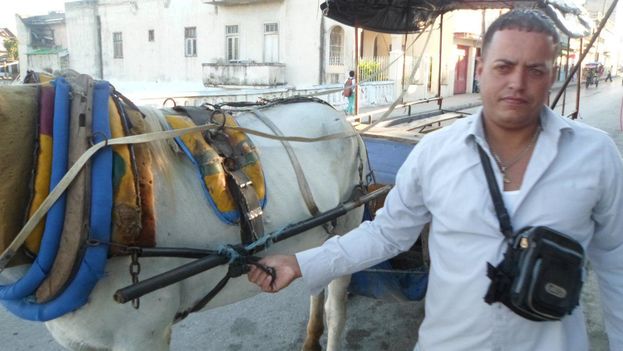
![]() 14ymedio, Carlos A. Torres Fleites, Santa Clara, 2 March 2018 — Twenty or so drivers of horse-drawn carriages in Santa Clara, operating as buses, protested this week in the face of regulatory measures that went into effect this Thursday that restrict the circulation of their horse carts on the city’s central highway. While the authorities claim that the initiative is intended to avoid traffic accidents and improve hygiene on the roads, the coachmen complain that from now on they will transport a smaller number of passengers and earn less money.
14ymedio, Carlos A. Torres Fleites, Santa Clara, 2 March 2018 — Twenty or so drivers of horse-drawn carriages in Santa Clara, operating as buses, protested this week in the face of regulatory measures that went into effect this Thursday that restrict the circulation of their horse carts on the city’s central highway. While the authorities claim that the initiative is intended to avoid traffic accidents and improve hygiene on the roads, the coachmen complain that from now on they will transport a smaller number of passengers and earn less money.
Last Tuesday, 21 of the cocheros, licensed as self-employed, presented themselves at the local headquarters of the Cuban Communist Party (PCC) to demand that the measure not take effect. During their time at the headquarters they were watched by a dozen police officers and several State Security personnel dressed in civilian clothes.
The coachmen held a meeting with Party members in the headquarters amphitheater, located on the road that goes to Camajuaní, according to Yosvani Ferrer, one of the drivers who participated in the meeting and spoke to 14ymedio.
A member of the PCC, who identified himself as Alejandro, informed the self-employed drivers that the measure is not intended to end this type of work, since it is “useful and indispensable,” but to prevent accidents on a street with high speeds and a lot of traffic.
The drivers now have as an alternative to travel via Independencia Street and their new staging area is located near the provincial Zoological Park. Drivers complain that there are fewer passengers in this area so their livelihoods will be affected.

The authorities also talked to the private transport providers about the problem of waste from the animals, which often ends up dumped in the streets and dirties the city.
Ferrer says that none of the complainants lost their composure and that all of the demands and questions were asked in a “correct manner.” However, after two hours of conversation the coachmen understood that the authorities’s decision was already taken and they would not be able to come to an agreement to postpone or prevent the measure.
Yasel Ramos, a coachman who has been serving the route from the Maternal Hospital to the Bus Terminal for eight years, is dissatisfied with the response received from the members of the Party.
Despite not participating in the meeting, the driver believes that the measure is “an abuse of and a lack of consideration” for those who work legally with vehicles of this type, which helps to alleviate the tense situation of passenger transport in the city.
Ramos says that the Diana-make state buses, newly incorporated into public service in the same area where the coachmen work, “do not carry 60 people because of their limited capacity.”
Another new state service with motorcycle-taxis also fails to meet passenger demand in the area because there are “only seven on that route,” Ramos said.
The horse-drawn carriages charge 2 CUP (about 8¢ US) per trip, while other private vehicles, such as cars or motorcycles, demand up to five times that price for the same route.
Yipsi Pérez, a nurse at the 20th Anniversary Polyclinic, believes the coachmen are a problem because they slow down the circulation of cars but, at the same time, they are indispensable for public transport.
The representatives of the Ministry of Transport who participated in the meeting at PCC headquarters informed the self-employed operators that in 2017, in the section of road at issue, alone, there were 22 accidents in which horse carts were involved.
In those accidents, 3 people died and there were 14 serious injuries, of which eight were to minors, in addition to thousands of pesos in material damages.
______________________________
The 14ymedio team is committed to serious journalism that reflects the reality of deep Cuba. Thank you for joining us on this long road. We invite you to continue supporting us, but this time by becoming a member of 14ymedio. Together we can continue to transform journalism in Cuba.
